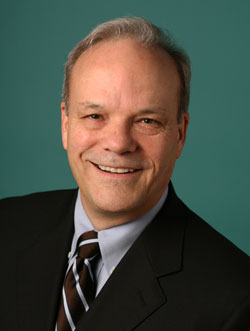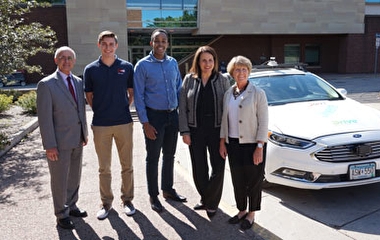Jay Cowles, the co-chair of the Itasca Project Transportation Committee, became the chair of the CTS Executive Committee in August. The Itasca Project is an employer-led alliance that seeks to address regional economic issues that affect competitiveness and quality of life in the Twin Cities region. Previously, Cowles held several positions with Cowles Media Company.
Cowles succeeds Jeff Hamiel, chair of the Metropolitan Airports Commission, who stepped down as chair after four years of dedicated service.
Below, Cowles shares his thoughts on how transportation research can help address future priorities, support growth, and guide decision making.
What transportation challenges do you think should be prioritized for Minnesota’s success?
Minnesotans have developed a robust diversified economy with great opportunities for the future, and the state’s population is growing significantly. One of our challenges as a state is how best to provide transportation systems that support economic growth—specifically a 30 percent projected jump in freight traffic—and that allow flexible movement for residents, also projected to grow by 30 percent or one million residents by 2040. This is a particular challenge when there are fiscal constraints, and many competing demands for government investment, such as education and health care.
More than ever, there is a need to understand the many dimensions of our transportation investments so we can be confident that our spending is achieving the greatest results for our businesses and communities. Commute time and congestion are familiar measures of efficiency, but trends toward denser downtowns, interest in more choices in transportation modes, significant growth in freight movement, and dynamic technology impacts all require careful and fact-based understandings of our transportation choices.
Minnesota is now competing in a global economy, and its transportation systems need to keep up with leading regions around the world.
How can U of M research help leaders address these challenges?
The U of M is a critical partner to the state’s leaders in providing timely, relevant research. For example, the groundbreaking Accessibility Observatory provides a compelling analysis of how transportation shapes real behavior. CTS enables a close partnership between the research resources at the U and the continually evolving needs of agencies such as MnDOT and Metro Transit, allowing them to adapt best practices with confidence.
CTS also helps by reaching creatively and effectively across disciplines—from public health to materials science to the social sciences to environmental sciences—to better address complex issues facing our community, Personally, I think one intriguing area of focus is the influence of the Internet, cloud computing, and mobile devices on the changing nature of work and lifestyle choices. Because technology cycles are shortening, and transportation systems require long project “runways” to be built, we need to keep a very current understanding of work and lifestyle changes.
How can the U of M and the private sector collaborate to improve transportation?
The U of M has developed a strong reputation for independent credible research and is invaluable in providing reliable facts and insights to the community. This is especially important to business leaders as they contemplate making their own investments in buildings and facilities. They need to know that the transportation infrastructure that they are relying on will perform, that their employees and customers can get to stores, offices, and facilities easily, and that their goods and services can be delivered efficiently in a timely manner. The engagement of CTS researchers with government, business, and community issues related to transportation helps build confidence and knowledge for good decision-making.
What role does the Executive Committee play in guiding and advancing the CTS mission?
The members of the Executive Committee come from many industry and agency sectors, and each person brings unique contributions. We regularly inform CTS and one another about the latest transportation-related ideas, successes, and concerns occurring in our diverse worlds. We also work to connect the U of M with emerging thought leaders, prospective research sponsors, and key transportation decision makers. By learning from research presentations and participating in events honoring outstanding students and researchers, members also show their personal support for the value of student and faculty work.



